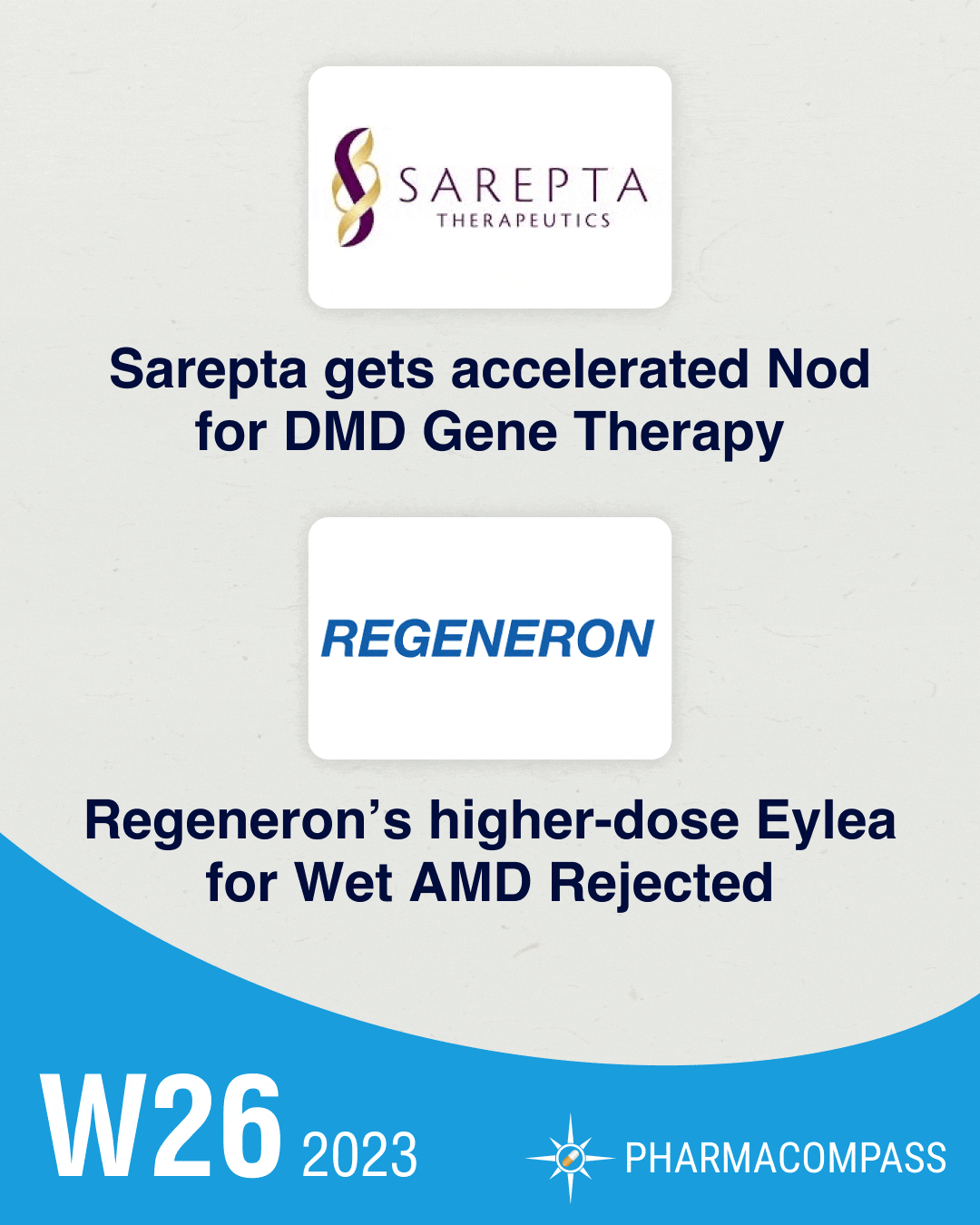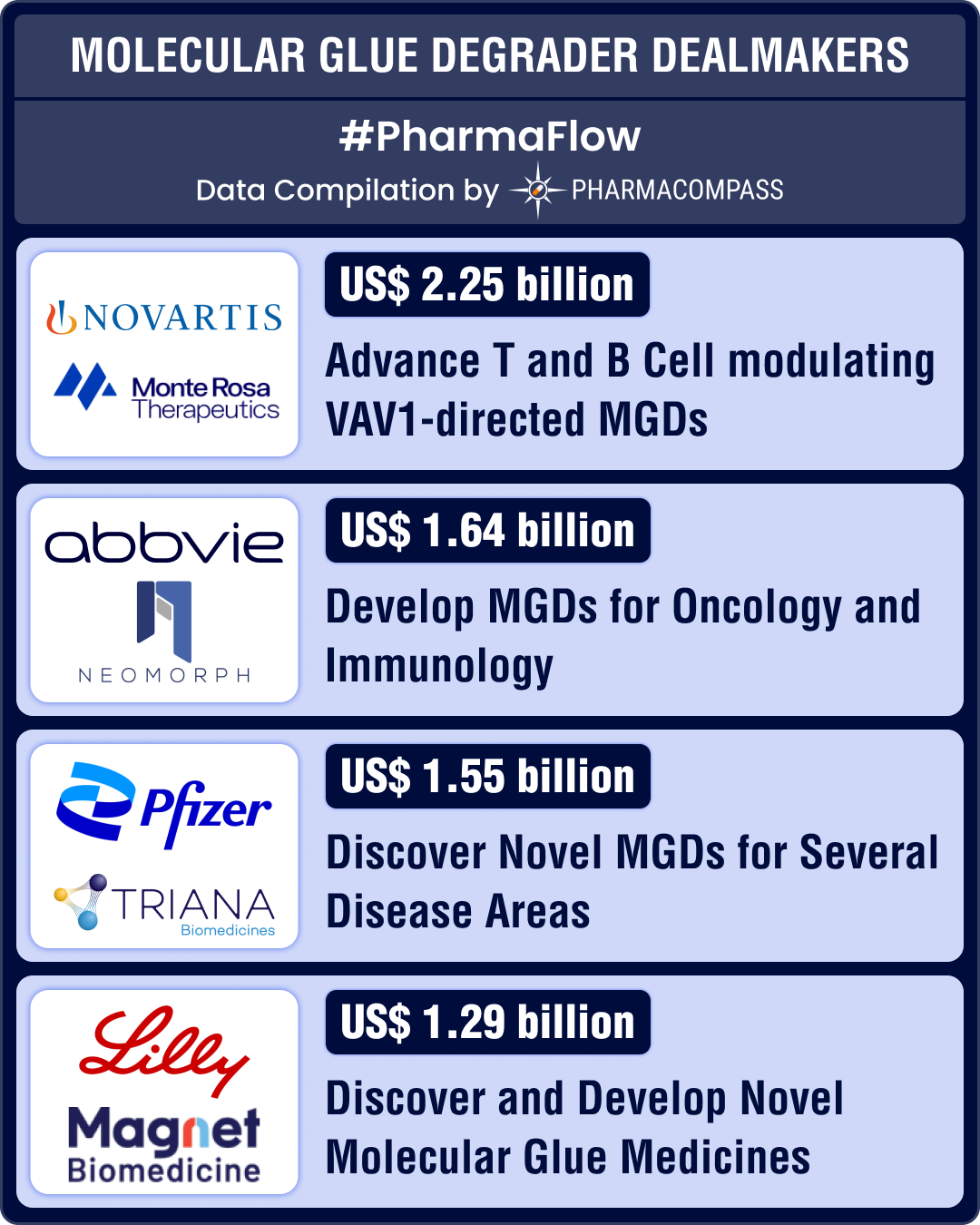
By PharmaCompass
2023-06-29
Impressions: 1,213
In this week’s Phispers, Sarepta Therapeutics’ Elevidys has received an accelerated approval from the US Food and Drug Administration (FDA) as the first-of-its-kind gene therapy for Duchenne muscular dystrophy (DMD) in children.
Pfizer’s oral tablet Litfulo (ritlecitinib) has been approved to treat severe alopecia areata in individuals aged 12 years and above. Belgium-based UCB has received approval for its subcutaneous injection Rystiggo (rozanolixizumab) for the treatment of adults with the two most common subtypes of generalised myasthenia gravis. And Pfizer and OPKO Health’s treatment for growth hormone deficiency in children has bagged FDA nod.
Meanwhile, FDA has rejected a higher-dose variant of Regeneron’s blockbuster drug Eylea for the treatment of wet age-related macular degeneration (AMD). The agency also rejected Intercept’s Ocaliva (obeticholic acid) for the treatment of patients with nonalcoholic steatohepatitis (NASH) and stage 2 or 3 liver fibrosis for a second time.
In other regulatory news, Ipca Laboratories’ manufacturing facility situated in Madhya Pradesh (India) has received a Form 483 with eight observations. Gland Pharma’s Pashamylaram, Hyderabad (India) facility has also received a Form 483 with one observation.
A Reuters report has claimed that Indian pharma Marion Biotech used toxic industrial-grade propylene glycol (PG) to manufacture the cough syrups that allegedly caused the deaths of 19 children in Uzbekistan.
FDA grants accelerated nod to Sarepta’s US$ 3.2 million gene therapy for DMD
FDA has granted accelerated approval to Sarepta Therapeutics’ Elevidys as the first-of-its-kind gene therapy for Duchenne muscular dystrophy (DMD). The therapy is approved for children between the ages of four and five years who have the ability to walk. DMD is an inherited progressive muscle-wasting disorder that usually affects young boys.
Priced at US$ 3.2 million, Elevidys is now the second-most expensive treatment globally, after CSL’s hemophilia B gene therapy (Hemgenix), which costs US$ 3.5 million.
FDA rejects higher-dose variant of Regeneron’s Eylea for wet AMD
FDA has rejected a higher-dose variant of Regeneron Pharmaceuticals’ blockbuster drug Eylea for the treatment of wet age-related macular degeneration (AMD), a leading cause of blindness in the elderly, along with two other eye conditions common in diabetic patients. In its complete response letter (CRL), FDA mentioned ongoing inspections of a third-party filler, but did not express concerns about the drug’s effectiveness, safety, or manufacturing and didn’t request any additional clinical data.
Regeneron, in partnership with Bayer, had also sought approval for the 8-mg version of Eylea to treat diabetic macular edema and diabetic retinopathy. Regeneron is currently collaborating with FDA and the filler to solve the issue. Eylea generated global sales of US$ 9.65 billion last year, but is now facing competition from Roche’s Vabysmo, a rival treatment approved for wet AMD and diabetic macular edema last year.
Intercept’s NASH treatment rejected again: Intercept Pharmaceuticals’ drug Ocaliva (obeticholic acid) has been rejected by the FDA for the treatment of nonalcoholic steatohepatitis (NASH) and stage 2 or 3 liver fibrosis. NASH, a form of fatty liver disease, affects approximately five percent of adults in the US but lacks approved treatments. This is the second time the drug has been rejected since 2020. Following the rejection, Intercept plans to discontinue all NASH-related investments and trim its workforce by one-third to save around US$ 140 million.
Pfizer-OPKO’s growth therapy bags approval; trial gains for Bayer’s Parkinson’s med
FDA has approved Ngenla — Pfizer and its partner OPKO Health’s treatment for growth hormone deficiency in children. The injectable hormone therapy has been approved for the treatment of children aged three and above. The therapy had been rejected in January.
Bayer’s stem cell therapy for Parkinson’s: Bayer subsidiary BlueRock Therapeutics has reported promising results from a phase 1 trial of its experimental stem cell therapy for Parkinson’s disease. The therapy – bemdaneprocel – was found to be safe and well tolerated by patients.
Pfizer’s Litfulo receives FDA nod to treat severe alopecia areata
FDA has approved Pfizer’s oral tablet Litfulo (ritlecitinib) to treat severe alopecia areata in individuals aged 12 years and above. Alopecia areata is an autoimmune disease that leads to hair loss. Litfulo is the second treatment to gain approval after Eli Lilly’s Olumiant, and the first drug to be approved for adolescents.
UCB’s myasthenia gravis drug approved: Belgium-based UCB has received approval for its subcutaneous injection Rystiggo (rozanolixizumab) for the treatment of adults with the two most common subtypes of generalised myasthenia gravis (gMG). Rystiggo is now the only FDA-approved treatment available for adults with positive anti-AChR and anti-MuSK antibodies. Generalised myasthenia gravis is a rare and chronic autoimmune disease.
GSK’s gonorrhea vaccine gets FDA’s fast-track status: GSK’s experimental gonorrhea vaccine has received FDA’s fast-track designation. The drugmaker is carrying out a phase 2 study of the investigational gonorrhea vaccine – Neisseria – to determine its efficacy in healthy adults who are at high risk of the infection.
Ipca Labs’ second facility in India receives FDA’s Form 483
Earlier this month, FDA had issued a Form 483 with 11 observations to Ipca Laboratories’ API manufacturing facility in Ratlam, Madhya Pradesh, India. Now, a second manufacturing facility situated in SEZ Indore in the same Indian state has received a Form 483 with eight observations. The agency conducted an inspection of the facility from June 15 to 23.
Meanwhile, Gland Pharma’s Pashamylaram, Hyderabad (India) facility has received a Form 483 with one observation. The agency had conducted a pre-approval inspection of the facility for seven products between June 15 and 27.
‘Marion used toxic, industrial grade input in cough syrups that led to Uzbek deaths’
Last year, toxic cough syrups manufactured by Indian pharma Marion Biotech allegedly caused the deaths of 19 children in Uzbekistan. An analysis by Uzbekistan’s health ministry found that the cough syrups – Ambronol and DOK-1 Max – contained unacceptable levels of toxins diethylene glycol (DEG) and ethylene glycol (EG). Now, a Reuters report has claimed that Marion used a toxic industrial-grade ingredient, propylene glycol (PG), instead of the legitimate pharma-grade version to manufacture the syrups. Marion purchased propylene glycol from Maya Chemtech India, a company that deals only in industrial-grade materials. Marion also did not test the ingredient before using it in the syrups, an investigator told Reuters. Marion had previously denied any wrongdoing.
The PharmaCompass Newsletter – Sign Up, Stay Ahead
Feedback, help us to improve. Click here
Image Credit : Phisper Infographic by PharmaCompass license under CC BY 2.0
“ The article is based on the information available in public and which the author believes to be true. The author is not disseminating any information, which the author believes or knows, is confidential or in conflict with the privacy of any person. The views expressed or information supplied through this article is mere opinion and observation of the author. The author does not intend to defame, insult or, cause loss or damage to anyone, in any manner, through this article.”








